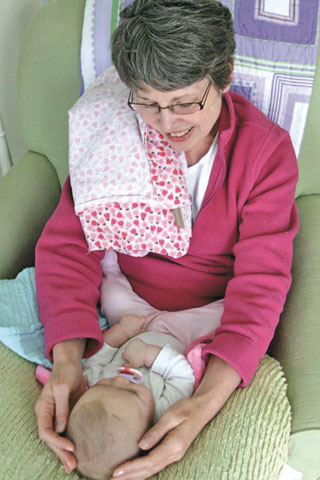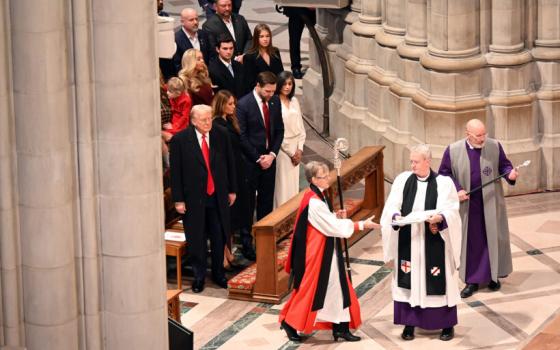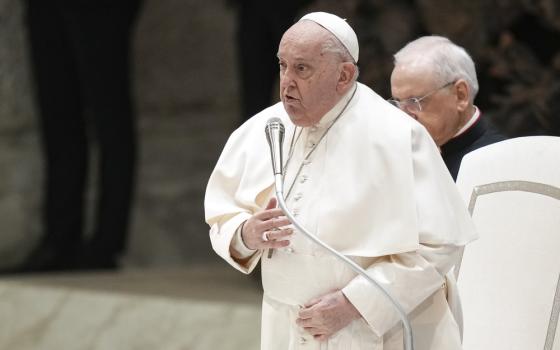
After another orthopedic surgery, Teresa Rhodes McGee recovers by listening to her grandniece Harper Grace.
I was lying half naked and tethered to an electrocardiogram machine. To my distress, the technician sighed. I asked if there was something wrong, and she said, "You are fine, but last week my mother-in-law died in Bangladesh, and I couldn't go home for the funeral. I've had no time to mourn." The computer traced my cardiac rhythms as she described the depth of her grief in an unexpected meeting of our hearts. As I was leaving, she said, "Thank you for listening. Please pray for me."
I remembered her in the long days of surgical recovery that I now call "going on retreat." I've had many orthopedic surgeries to correct painful deformities caused by two decades of rheumatoid arthritis. The stillness required for bones and metal plates to grow together creates space for me to pray, carried as I am on the grace of other people's kindness. I have lots of time to read and meditate from a level of vulnerability and dependence that are essential to healing. Yet the gift of those days and, I dare say, of a chronic illness itself is the constant opportunity to heed the words of Isaiah: "Listen that you might live."
Much of my professional life was devoted to active listening. I traveled the world as the director of international human relations operations for a human rights organization, listening to stories and concerns, confident that I could figure things out, or failing that, push through difficulty. I do not give up easily, a stubborn resolve that has served me well in life even as it has, on more than one occasion, overtaken good sense. I brought that force of will to my illness, pushing through pain, fatigue and medication side effects long past the point that was reasonable.
But a hospitalization three years ago led me to understand that not listening to the vulnerabilities of my own illness is life-threatening, something my doctor had been saying for some time. I knew for years that the nature of rheumatoid arthritis could cause a sudden change in my ability to navigate the world, and of course I believed I could outrun it. Assumptions of control and invulnerability have a powerful way of drowning out the truth.
After I left the hospital, I went on a sick leave with hope that I would get better. When it was clear that I was living a new phase of the disease, I made the painful decision to leave the work I loved. The day I signed the resignation papers, I put away my well-stamped passport and all my anticipated journeys. I donated my business suits and briefcases to a program that provides work clothes to women in transition. I discovered how much I depended on my professional identity when it was suddenly gone, and with it the scaffolding of my days. I did not know quite what to do with myself, especially because I did not, and do not, have the energy to undertake all the projects that live in the back of my mind. The most daunting aspect of the transition is that what I considered my best stuff -- self-defining strength, determination and hard work -- are not only useless but could do me harm. Sooner or later, we all find ourselves in this kind of impasse in which past resources, points of identity and strengths are no longer available or helpful. It takes time and patience to listen to the emptiness long enough to know that what feels like loss is the energy of conversion.
I am discovering the contours of that conversion as I learn to differentiate bird songs and hear the words of Scripture with an embodied appreciation of the great reversals that are at the heart of the Gospel. I am amazed what people tell me in the course of the day, how often I am asked to pray for someone and how delightful it is to do so without the pressure of time.
Listening from brokenness becomes its own strength because although we come to it on different paths, our shared humanity guarantees the experience of painful limits and unchosen loss. I am about to begin another eight-week "retreat," a sacred opportunity to hear and tend the cry for healing we all carry in our bones. To do so has become my unexpected vocation.
[Teresa Rhodes McGee lives in New York. Her books include Transforming Trauma: A Path Toward Wholeness and Mysteries of the Rosary in Ordinary Life.]



